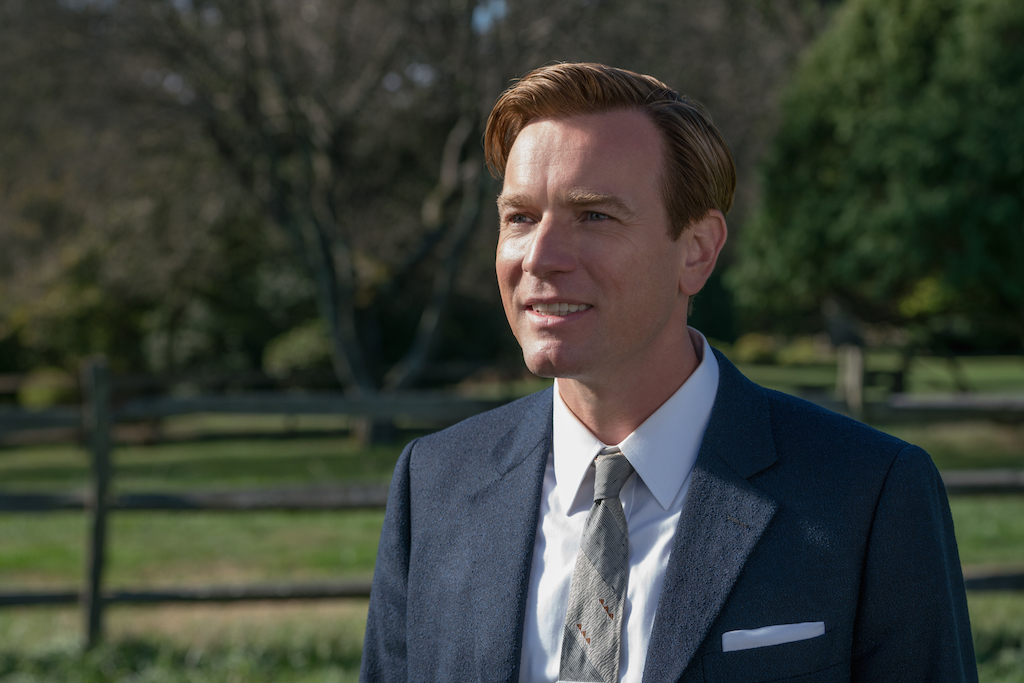
This review contains some spoilers
Why, oh why, would first-time director Ewan McGregor tackle a work as ambitious as Philip Roth’s American Pastoral? And why would he put himself at an instant disadvantage by casting himself as Seymour “the Swede” Levov—the strapping, near-mythical alpha male of Roth’s novel? McGregor is a fine actor but he is not a robust physical presence (a younger Liam Neeson would’ve been aces). His own miscasting—the very kind of thing a female director would be excoriated for as an indication of vanity—starts him off in a hole that the film can never recover from.
The book, which I read many years ago, is a long, richly descriptive and elegiac tale of American post-war identity and lost innocence. As always with Roth, the internal life of the characters is key (and notoriously hard to translate to film) and it’s the specificity of the details—for example, the intricate process of making a woman’s glove (the Swede is a glovemaker)—that makes the novel sing. Neither of these are evident in McGregor’s largely prosaic adaptation.
What you’re left with, instead, is the plot, which, frankly, feels regressive or misogynist or both. Our narrator is Roth’s alter ego Nathan Zuckerman (David Strathairn), who attends his 45th high school reunion in Newark, New Jersey, only to discover this his childhood hero, “the Swede”—so nicknamed because, although Jewish, he had blond hair, blue eyes, and was an All-American athlete—did not have the ideal life Zuckerman imagined for him, but, in fact, led a life of strife and disappointment.
From there, we flash back to the Swede’s story. After high school, he married a Catholic beauty queen named Dawn (Jennifer Connolly), much to the consternation of his father (Peter Riegert, bringing a welcome dose of earthiness and humor to the proceedings)—and the newlyweds bought a cattle farm in the exurbs, while the Swede also continued to run his family’s glove factory. The couple had one daughter, Merry (played by Ocean James and Hannah Nordberg as an 8- and 12-year-old, respectively), with a bad stutter and a somewhat unhealthy attachment to her father. (After a camping trip, she asks her father to kiss her “the way you kiss Mom.”) The stutter is so debilitating, they take Merry to a therapist (Molly Parker, in a part that is both undercooked and unexpectedly important to the story), who explains that Merry feels she can’t live up to her superstar parents and the stutter is her way of getting attention. This seems a strange diagnosis, as Merry is doted on by her parents and, in the movie at least, they put no pressure on her to be anything other than a normal, happy kid.
As she grows into her teenage years, Merry (now played with convincing fury by Dakota Fanning) becomes increasingly alienated and hostile, particularly toward her mother. She has gotten involved with a group of antiwar protestors in Manhattan, and when the Swede advises her to stay away from them and “bring the protest home,” she perhaps takes him too literally. Late one night, a local post office is bombed, leaving one dead—and Merry, who has disappeared, as the prime suspect. The Swede is absolutely distraught and will stop at nothing to find and vindicate his daughter. Dawn, after a brief nervous breakdown, decides to put the past behind her, get a face-lift, and re-embrace her life as a glamorous beauty queen.
There is a third horrible woman who enters the picture in the form of Rita Cohen (Valorie Curry), another underground war protestor, who tries to blackmail the Swede in exchange for providing him with information about Merry. There’s an off-putting scene in a hotel room where she attempts to seduce him, to what end I’m not quite sure. He, of course, is horrified by her and rejects her advances.
So let’s add this all up, shall we? We have an ingrate of a daughter, who is also possibly a murderer. We have a shallow wife, who would rather be adored as a beauty queen than grieve for her daughter. We have a deceitful and crassly seductive war protestor. And yes, the female psychiatrist plays a less than honorable role in all of this, too.
Meanwhile, the Swede is just a devoted, baffled, upstanding man—the last vestiges of The Greatest Generation or The Great White Hope, or something like that. (Race also plays an uncomfortable role in the film: Bucking convention at the time, the Swede employs African-American women at the factory and they are fiercely loyal to him, even as race riots rage in the streets. The whole thing feels troublingly paternalistic.)
I’m honestly not sure what drew McGregor to this story to begin with. He’s a Scotsman and, if nothing else, this is a deeply American tale. What’s more, the Swede isn’t even a particularly interesting character, at least not as he’s depicted here. Everyone in the cast tries really hard—especially Connolly who does a lot of capital-A Acting!—but an air of self-important solemnity pervades every frame. Is McGregor a bad director? Lords knows he’s not the first to swing and whiff at Roth. I’ll give him a mulligan here.
